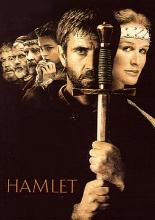SCENE i
Rosencrantz and Guildenstern seem attached at the hip with Claudius now. They enter with the royal couple only to be dismissed immediately without saying any lines. Gertrude doesn't "rat" out Hamlet regarding the Polonius incident: it's close enough to be mere reporting, but doesn't acknowledge what Hamlet is obviously all about. Claudius is nevertheless able now to consider Hamlet a danger, mentions his plan to ship him off, and calls Rosencrantz and Guildenstern back in to have them fetch Hamlet to him.
SCENE ii
Hamlet toys with Rosencrantz and Guildenstern over stashing the body of Polonius. He calls Rosencrantz a "spunge" who "soaks up the king's countenance, his rewards, his authorities" (IV.ii.15-16). He says, "The King is a thing ... Of nothing" (IV.ii.28-30), and agrees to go with Rosencrantz and Guildenstern.
|
SCENE iii Claudius frets over the fact that Hamlet is "lov'd of the distracted multitude" (IV.iii.4). When Hamlet is brought in, he toys with Claudius over stashing the body of Polonius, indulging in a conceit about wormfood: Polonius is at supper, "Not where he eats, but where 'a is eaten; a certain convocation of politic worms are e'en at him. Your worm is your only emperor for diet" (IV.iii.19-21). It's a morbid preoccupation, but a standard medieval trope, designed to provoke a proper focus away from ultimately futile worldly matters; here, though, it just seems nihilistic. It also serves as a dig at Claudius. Hamlet's gross depiction of the "circle of life" ends up showing "how a king may go a progress through the guts of a beggar" (IV.iii.30-31). Hamlet responds to the question as to Polonius' whereabouts, saying, "In heaven, send thither to see; if your messenger find him not there, seek him i' th' other place yourself" (IV.iii.34-35). It's a clever Shakespearean way of saying, "go to hell." Hamlet is to be sent to England, and Claudius will send accompanying papers requesting that he be killed: "Do it, England" (IV.iii.65). Imagine how the original audience would take that!
|

|
SCENE iv
Fortinbras has mastered his passions and is directing his energies into military action. Hamlet's last soliloquy -- "How all occasions do inform against me" (IV.iv.32ff) -- concerns this honor, if that's what it is, since so many will die in war. One wonders if he really believes in his heart that this business is honorable -- it seems so arbitrary: for a scrap of Polish land -- "a little patch of ground" (IV.iv.18) -- thousands of souls are likely to die. "Rightly to be great / Is not to stir without great argument, / But greatly to find quarrel in a straw / When honor's at the stake" (IV.iv.53-56). "O, from this time forth, / My thoughts be bloody, or be nothing worth" (IV.iv.65-66). "Shakespeare here, as in many places in his plays, makes plain his sardonic contempt and distaste for the whole apparatus of war and national glory" (Asimov 133).
SCENE v
Ophelia's bizarre behavior bears scrutiny now. She's acting mad, but not acting.
Her speech is nothing,Her songs include smut unrelated to the death of her father, even though Claudius seems to want to think that Ophelia's madness stems entirely from Polonius' death (IV.v.75-76). Her statement, "You must wear your rue with a difference," may be a punning reference to "different rue," or "divers rue" = Devereux -- another Leicester connection (Ogburn and Ogburn 674).
Yet the unshaped use of it doth move
The hearers to collection; they yawn at it,
And botch the words up to fit their own thoughts....
(IV.v.7-10)
Laertes returns, backed by the Danish "rabble" (IV.v.103). "The ease with which popularity can be lost and public opinion made to veer makes it clear that both Claudius and Hamlet are entirely right in trying to effect their respective ends in as cautious and circumspect a manner as possible" (Asimov 135). Laertes delivers bombastic pronouncements of vengeance for the death of his father. He is further tortured by Ophelia's insanity, as are we. What the King tells Laertes afterwards we don't hear.
Ophelia is mad and distributing botanical gifts: rosemary, "symbolic of fidelity in love because its fragrance lingered over long periods" (Asimov 137), pansies, and so on. The interesting facet of this scene is that we hear how everyone at court is listening carefully to Ophelia's rantings, trying to sift out some key to explain matters. Well, the critics do this. We do this. And there have been some cuckoo notions to come out of the process too, including the insupportable theory that Ophelia is pregnant. In any case, the poison that serves so well as a theme in the play is spreading.
SCENE vi
Horatio reads a letter from Hamlet regarding pirate abduction.
SCENE vii
The King has told Laertes his side of the story, claiming his own hands are somewhat tied because of the tremendous affection he has for Hamlet's mother and also "the great love the general gender bear him" (IV.vii.18). Laertes is another willing dupe, and his rage over his father's death is manipulated by Claudius so that he is goaded into a fight with Hamlet in the future. And poison may be involved too, but they'll plan more later. Laertes is in a sense opposite of Hamlet in that he's ready for action without sufficient thought first. Laertes, we suspect, is a composite character, or a palimpsest, first having been a representative of Philip Sidney, later of Robert Cecil (Ogburn and Ogburn 697).
Gertrude enters and recounts Ophelia's apparent suicide -- although how she knows so much about it in detail is unclear! Ophelia went through with what Hamlet obsessively considered: suicide. She was apparently sensitive enough to be in agony after being treated as a sexual pawn by everyone obsessed with her purity. "Ver is punned on for wyll or brook; and 'willow' is wyll O" (Ogburn and Ogburn 678). "She was never so real to him as after her death, when her memory, or the idea of her, tormented him with a sense of anguish and guilt. And this statement applies to both the Earl [regarding Anne] and the Prince" (Ogburn and Ogburn 677).
Biographical Notes
Burghley expressed pride at having been born during the Diet of Worms (the convocation of secular and church leaders in the German city and presided over by the emperor), so Hamlet's statement that "Your worm is your only emperor for diet" (IV.iii.21) among his other ramblings puns on that connection with Polonius.
Hamlet mentions the pirate attacks on his way to England -- extraneous material for this plot, but Oxford's ship was attacked while he was returning to England in 1576 (Anderson 206).
It's difficult to understand how Hamlet has had the opportunity to be "lov'd of the distracted multitude" (IV.iii.4), but this too parallels Oxford's situation. The anonymous celebratory poem recounting Elizabeth's processional in honor of Sir Francis Drake suggests that Oxford had a clownish public persona:

|
Sir Francis, Sir Francis, Sir Francis is come;
Sir Robert, and eke Sir William his son, And eke the good Earl of Huntington Marched gallantly on the road.
Then came the Lord Chamberlain with his white staff,
|
The white staff identifies the Lord Great Chamberlain, Oxford. Unless an on-the-spot visual stunt with his ceremonial prop has gone unreported, it would seem from this immediate public response that the mere sight of Oxford sparked comic delight in the crowd.
The Spanish ambassador's letter to his king about English court events in 1578 wrote, "The Earl of Oxford [is] a very gallant lad ... who has a great following in the country" (qtd. in Clark 659). "This 'following' was due, I believe, to the popularity of his plays which were rehearsed at the public theatres or so-called 'private' theatres in preparation for their production at Court; possibly even to the fact that he sometimes appeared in them himself" (Clark 659).